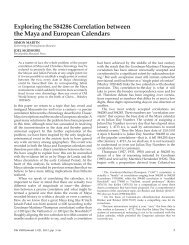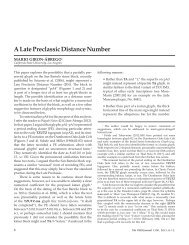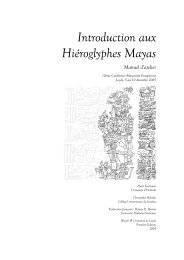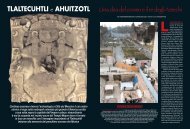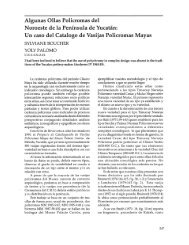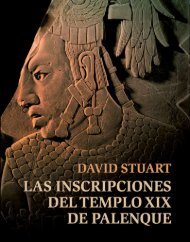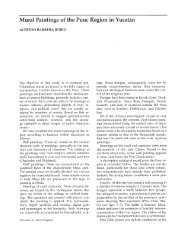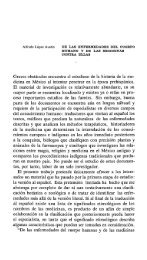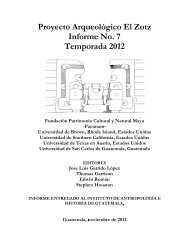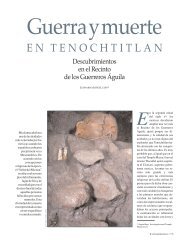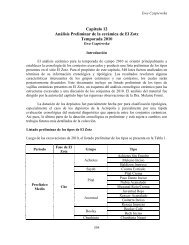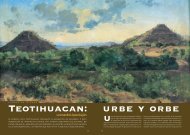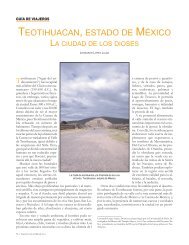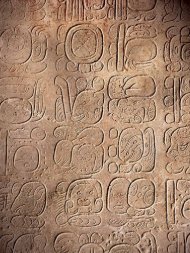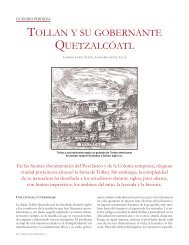Popol Vuh: Sacred Book of the Quiché Maya - Mesoweb
Popol Vuh: Sacred Book of the Quiché Maya - Mesoweb
Popol Vuh: Sacred Book of the Quiché Maya - Mesoweb
Create successful ePaper yourself
Turn your PDF publications into a flip-book with our unique Google optimized e-Paper software.
significantly in time, and that, in any case, <strong>the</strong> ultimate downfall <strong>of</strong> <strong>the</strong> city was preceded by<br />
a long period <strong>of</strong> decline after <strong>the</strong> tenth century (Morley, Brainerd, and Sharer 1983, 167;<br />
Schele and Ma<strong>the</strong>ws 1998, 197-255; Akkeren 2000, 314-315). Chichen Itza had been <strong>the</strong><br />
dominant force in <strong>the</strong> lowland <strong>Maya</strong> world. Its collapse disrupted <strong>the</strong> traditional politics and<br />
interregional trade <strong>of</strong> <strong>the</strong> region, resulting in <strong>the</strong> displacement <strong>of</strong> numerous groups <strong>of</strong> people<br />
seeking new power bases and economic opportunities (Fox 1978, 2). Many <strong>of</strong> <strong>the</strong>se groups<br />
claimed authority based on <strong>the</strong> old Mexican-influenced symbols <strong>of</strong> power and prestige (Roys<br />
1967, 88-98; Schele and Ma<strong>the</strong>ws 1998). It is possible that elements <strong>of</strong> what would become<br />
<strong>the</strong> ruling Cavec-<strong>Quiché</strong> lineage and related highland <strong>Maya</strong> progenitors were part <strong>of</strong> this<br />
human wave.<br />
Thus, at Tulan, <strong>the</strong> founding lineages <strong>of</strong> <strong>the</strong> various highland <strong>Maya</strong> kingdoms were given<br />
<strong>the</strong>ir titular gods, as well as tokens <strong>of</strong> “Toltec” rule (many <strong>of</strong> which bore Nahua language<br />
names) and commissioned to leave in search <strong>of</strong> places to conquer (pp. 213, 257-260).<br />
Numerous highland <strong>Maya</strong> documents speak <strong>of</strong> this pilgrimage to Tulan as a means <strong>of</strong> securing<br />
tokens <strong>of</strong> power and legitimacy. This account is from <strong>the</strong> Annals <strong>of</strong> <strong>the</strong> Cakchiquels:<br />
Then we arrived at Tulan in <strong>the</strong> darkness and in <strong>the</strong> night. Then we gave <strong>the</strong> tribute,<br />
when <strong>the</strong> seven tribes and <strong>the</strong> warriors carried <strong>the</strong> tribute. We took our places in order at<br />
<strong>the</strong> left part <strong>of</strong> Tulan.... And after <strong>the</strong> seven tribes had arrived, we <strong>the</strong> warriors came. So<br />
<strong>the</strong>y said. And commanding us to come, <strong>the</strong>y said to us, our mo<strong>the</strong>rs, and our fa<strong>the</strong>rs:<br />
“Go, my daughters, my sons. I will give you your wealth, your domain; I will give you<br />
your power and your majesty, your canopy and your throne. Thus shall <strong>the</strong>y pay tribute<br />
to you.... Truly, your glory shall be great. You shall not be disparaged. You shall become<br />
great with <strong>the</strong> wealth <strong>of</strong> <strong>the</strong> wooden shields. Do not sleep and you shall conquer, my<br />
daughters, my sons! I will give your domain to you, <strong>the</strong> thirteen chiefs, to all <strong>of</strong> you<br />
equally: your bows, your shields, your domain, your majesty, your greatness, your canopy,<br />
and your throne. These are your first treasures.” Thus <strong>the</strong>y spoke to <strong>the</strong> <strong>Quiché</strong>s when<br />
<strong>the</strong> thirteen groups <strong>of</strong> warriors arrived at Tulan. (Recinos and Goetz 1953, 50)<br />
The authors <strong>of</strong> <strong>the</strong> <strong>Popol</strong> <strong>Vuh</strong> wrote that <strong>the</strong>ir brethren scattered in many different<br />
directions after departing from Tulan (pp. 230-232). Indeed, <strong>the</strong> <strong>Quiché</strong>s described <strong>the</strong>ir<br />
ancestors more as refugees than as well-prepared and organized military colonists:<br />
This is what preoccupied <strong>the</strong>ir hearts as <strong>the</strong>y passed through <strong>the</strong>ir great afflictions.<br />
They did not have food or sustenance. They would only sniff <strong>the</strong> bottoms <strong>of</strong> <strong>the</strong>ir staffs<br />
to feel as if <strong>the</strong>y were eating. But <strong>the</strong>y did not eat when <strong>the</strong>y came. (p. 221)<br />
20



